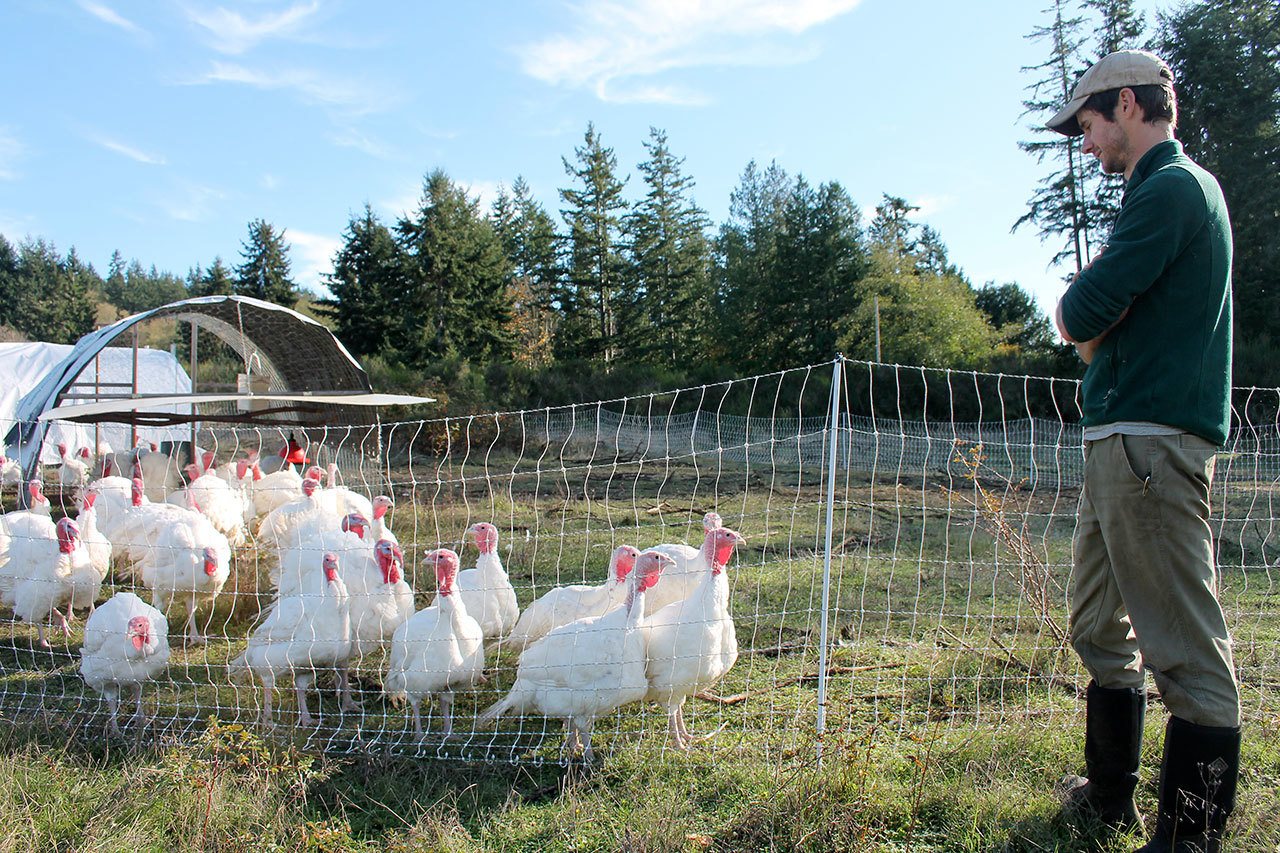Just north of the Bayview Cash Store, a rafter of turkeys graze Kevin Dunham’s homestead in search of their daily nutrition, to stretch their legs or, well, do whatever turkeys do.
These are humanely raised birds, but they will be slaughtered in two weeks time to fill stomachs and oversized plates for Thanksgiving.
Dunham, the small-scale homesteader behind it all, has been raising the group of turkeys since July on the property he’s renting on Bayview Road. There are 55 in total, roughly 10 of which are still available for taking. The turkeys are estimated to range from 16 to 21 pounds. These are broad-breasted white turkeys, the common breed found at grocery stores, but their lifestyles have been completely different from the turkeys wrapped in plastic at the food market. They were raised in a movable coop to give them new space to graze, while they naturally return the favor to Dunham’s land.
“They’re going to help grow some nice grass for next year,” Dunham said. “They get about an eighth of an acre and they get a good amount of space every week for foraging, eating grass and grazing.”
The turkeys eat well. In addition to the food they gather through foraging, they’re fed an organic, soy free, non-GMO feed from Bellingham-based organic poultry feed company Scratch and Peck Feeds. Dunham takes half of the feed he buys and ferments it to increase vitamin and protein content and provide probiotics for the birds’ diets.
Dunham’s big day, the long and grueling slog when he slaughters and processes the 55 turkeys, is on Monday, Nov. 21. Processing will be done on site in compliance with state regulations. The turkeys must be sold within 48 hours of slaughter as per state law, so Dunham is looking for fill reservations soon.
The meat costs $6 per pound. Those who are interested can contact Dunham at (206) 719-0093 or at kevindunham@live.com.
“I was delighted to see that Kevin was offering turkeys because they are so difficult to find,” said Slow Food Whidbey Island Membership Coordinator Kathy Floyd. “Let’s face it, pastured meat simply tastes better.”
Although getting sustainable Thanksgiving turkeys may be less economical than mass produced turkeys, the farmers who raise them and those who buy them are firm believers of a more personal, localized method of purchasing meat over the current food system that is in place. Dunham says some people are iffy about meeting their meat, but he believes it’s important for buyers to have that in their consciousness and to understand the work that goes into raising meat. The out-of-sight, out-of-mind approach of factory meat is not only unsustainable, he says, but immoral.
“On the culminating slaughter day, where it all seems to build up to that point, we want to do them the best honor and justice,” Dunham said. “To me, it’s worth it to raise them this way, because I think animals deserve that treatment because we get so much from them.”
Buying local meat is also beneficial to the local economy, according to Dunham. He says the money is being circulated locally rather than being shipped to some distant corporation, and has a better chance to make its way back to the purchaser. Mervyn Floyd, president of Slow Food Whidbey Island, added supporting your local farmer and the small scale system is crucial.
“It’s important to form a connection with your local farmer and understand what it takes to produce healthy food,” Floyd said. “It’s one way of giving thanks to your local farmer who is doing it more because they believe rather than for the minimal and intensely variable profit.”
Sustainably raised turkeys are also much healthier, Dunham and Floyd say. The organic feed they’re given provides them with nutrients the mass produced turkeys simply lack. Dunham adds the healthier the bird is, the healthier the food is for the consumer. Floyd points out that without being pumped with growth hormones, the turkeys don’t suffer from medical issues that come with them and the overcrowded pens they live in. They don’t require regular doses of medication to stop the spread of disease.
“The other key issues are that they are not packed with diverse, unknown forms of medication or plumped with salty water to make them weigh more,” Floyd said.
Most importantly to carnivorous holiday eaters, though, is the taste. Dunham said the meat is going to not only taste different, but more complex due to all the blood flowing through their muscles as a result of their ability to graze. Their legs will be darker than what is typically found at the grocery store, and the additional nutrition in the turkeys’ diets also shines through in their taste. Dunham will definitely take one of the birds for himself.
It may be heavier on the wallet, but it’s worth it for those who follow their taste buds.
“The grocery store ones can cost one quarter of the price of the pasteurized turkeys,” Kathy Floyd said. “But when you measure the taste, the humane growing methods, the support of our local farmers and the ability to meet your meat, the local farmer has it all over the grocery store.”



